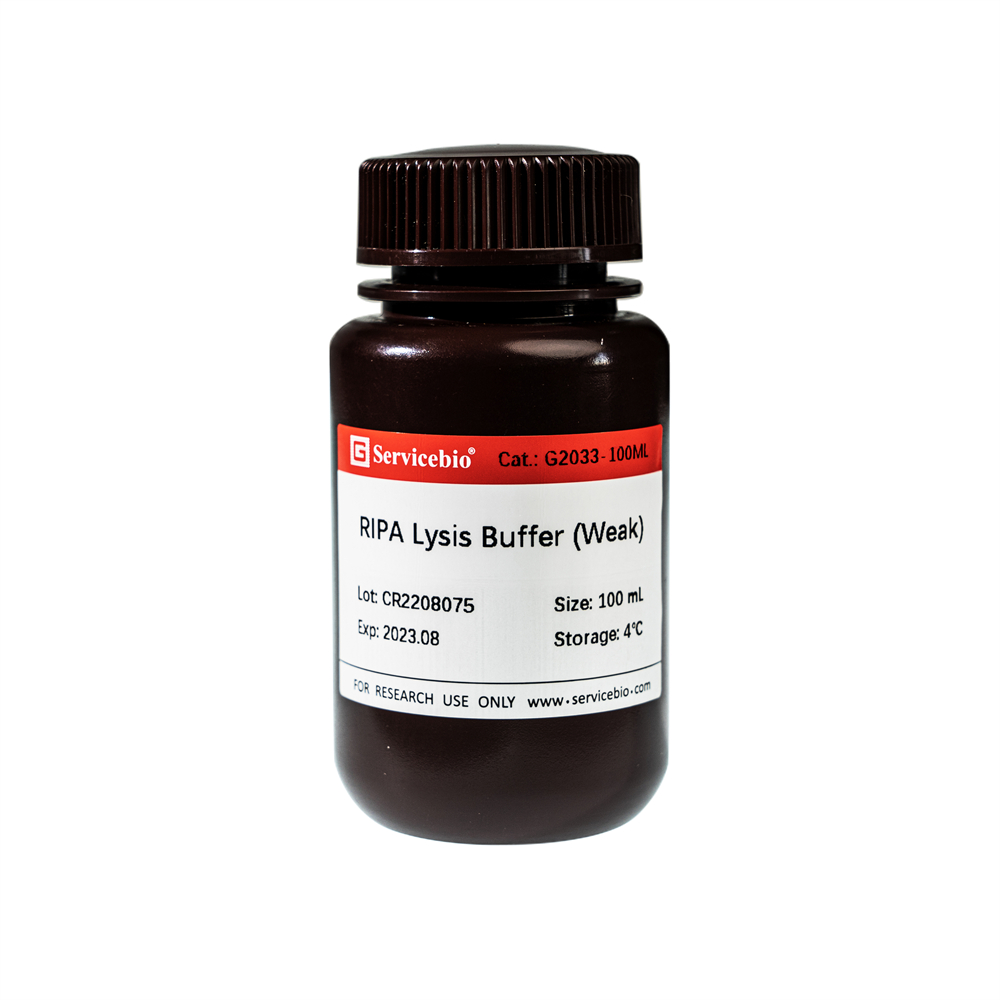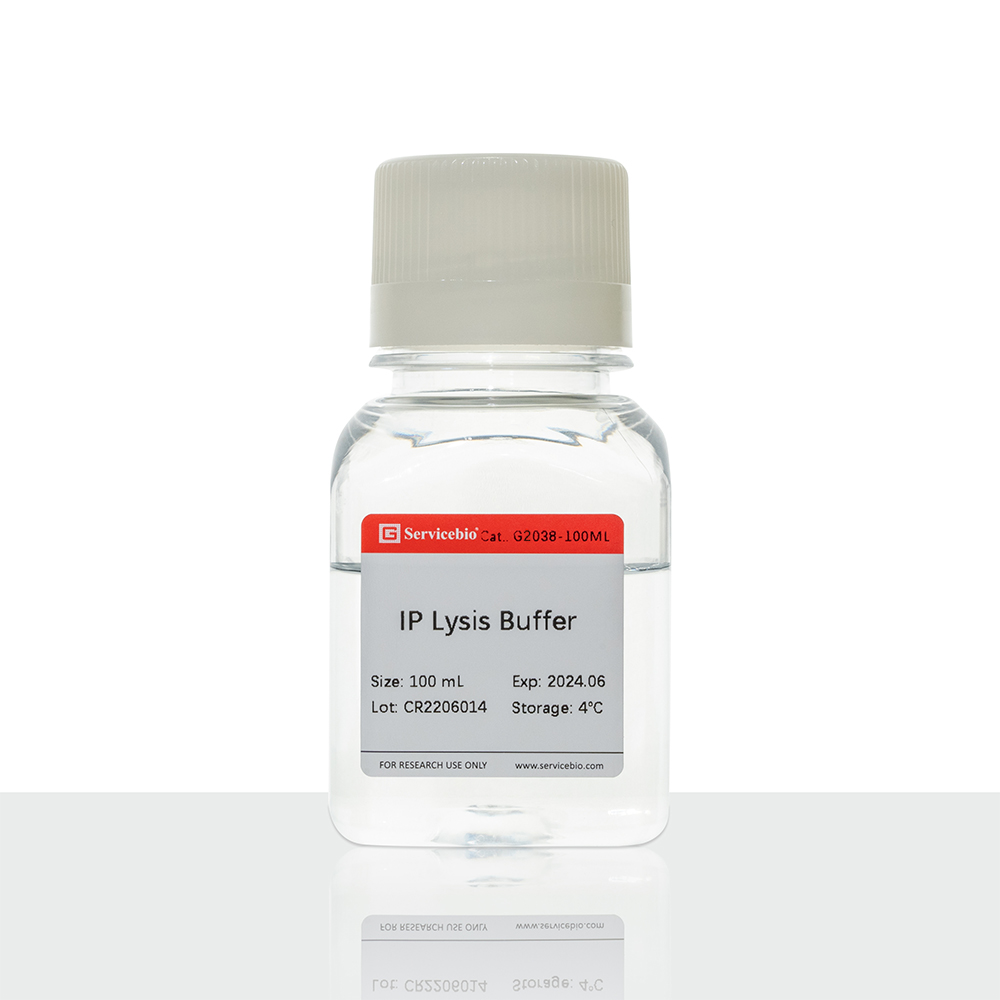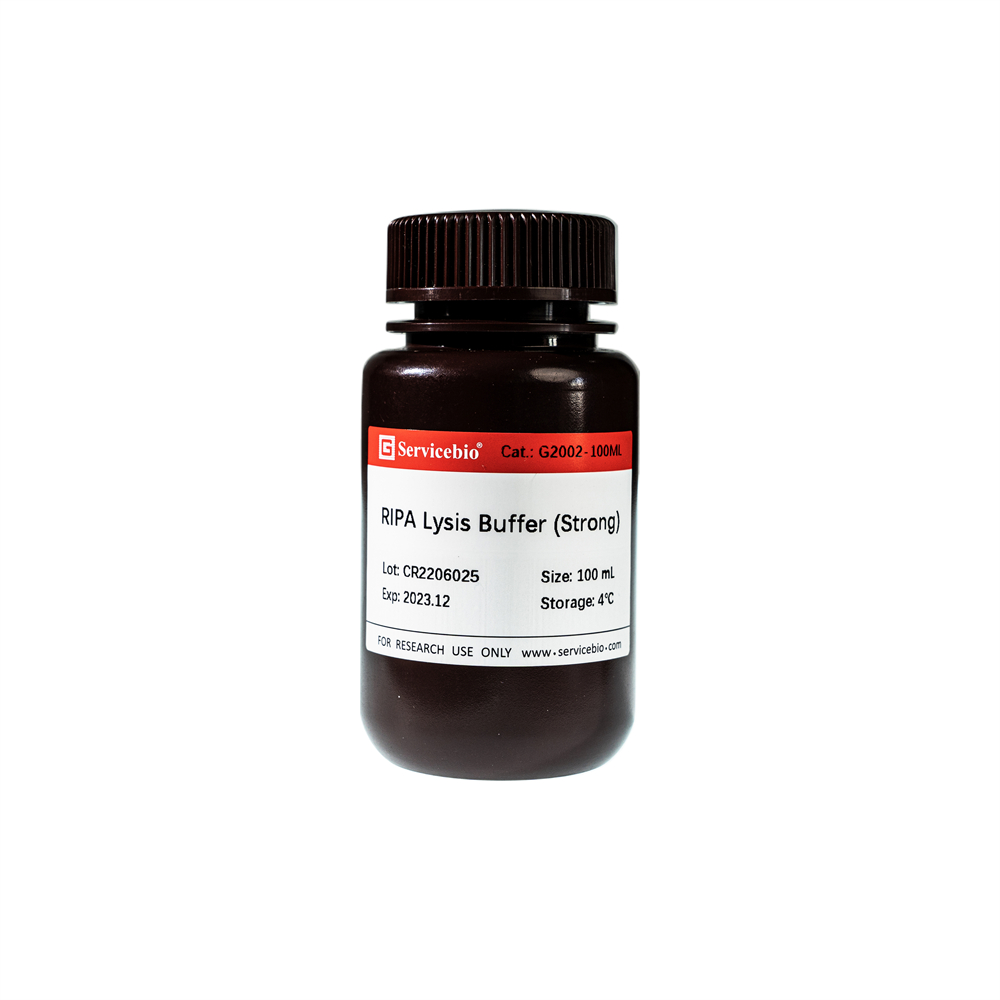Description
Product Information
| Product Name | Cat.No. | Spec. |
| RIPA Lysis Buffer (Weak) | G2033-30ML | 30 mL |
| G2033-100ML | 100 mL |
Description/Introduction
RIPA Lysis Buffer (RIPA Lysis Buffer) is a traditional rapid lyse solution for cells and tissues. Protein samples obtained from tissues and cells cleaved by RIPA lysate can be used for routine PAGE, Western, immunoprecipitation (IP), co-IP and other experiments’ cracking fluid has many formulations, according to its cracking effect is mainly divided into strong, medium and weak three kinds. This product is a weak cracking liquid of RIPA. Its main components include 50 mM Tris-HCl (pH 7.4),150 mM NaCl,1 mM EDTA-2Na2,0.25% Sodium deoxycholate and 1% NP-40.This product is suitable for animal or plant tissue and cell samples, can also be used for fungal or bacterial samples.
Storage and Handling Conditions
Wet ice bag transportation; Stored at 4℃ in the dark; valid for 12 months。
Component
| Component | G2033-30ML | G2033-100ML |
| RIPA Lysis Buffer (Weak) | 30 mL | 100 mL |
| Manuals | One copy | |
Assay Protocol / Procedures
Protease inhibitor is provided by your own. The RIPA lysate (weak) should be added with protease inhibitors before use. G2006, G2007, G2008, etc., are recommended to prevent protein degradation. The RIPA lysate (weak) mentioned in the following usage means that protease inhibitors have been added.
• For tissue samples:
1. The tissue blocks were washed with pre-cooled PBS (recommended G4202) to remove blood stains, and then cut into small pieces and placed in the homogenizer.
2. Add 10x tissue volume of RIPA lysis buffer (weak) and homogenate at low temperature (It is recommended to use high-speed tissue grinding instrument KZ-III-F and KZ-III-FP, which is independently developed and produced by Servicebio). Note: the amount of RIPA lysate (weak) can be added in a ratio of approximately 50 mg of tissue to 1 mL of lysate. If the content of tissue protein is low, the dosage of lysate can be reduced to increase the protein concentration in crude extract solution.
3. Transfer the homogenate to a 1.5 mL centrifuge tube and oscillate. Ice bath for 30 min, during which the pipette was repeatedly blown to ensure the complete lysis of tissue cells;
4. For 12000g samples, it should be centrifuged for 5 min and collect the supernatant, which is the total protein solution.
• For adherent samples:
1. Wash the cells with PBS for 2-3 times, and blot the residual liquid thoroughly for the last time.
2. Pour RIPA lysate (weak) into the cell culture plate and flask according to the ratio of 250μL cell lysate per well of 6-well plate, shake the culture plate and flask repeatedly, and make the lysate fully contact with cells for 3-5 min.
3. Scrape off the cells with a cell spatula and collect into a centrifuge tube.
4. Centrifuge at 12000 g for 5 min and collect the supernatant, which is the total protein solution.
• For suspension cell samples:
1. Centrifuge and collect the cells.
2. Pour RIPA lysate (weak) into the cell culture plate and flask according to the ratio of 250μL cell lysate per well of 6-well plate, shake the culture plate and flask repeatedly, and make the lysate fully contact with cells for 3-5 min.
3. Ice bath for 30 min. During this time, pipette was used for repeated blows several times every 10 min to ensure complete cell lysis.
4. Centrifuge at 12000 g for 5 min and collect the supernatant, which is the total protein solution.
• For bacterial or fungal samples:
1. 1 mL bacterial suspension was taken, centrifuged to remove the supernatant, and washed with PBS once to fully remove the liquid. Vortices disperse the thallus as much as possible.
2. Add 100-200 μL RIPA lysis solution (weak), swirl gently to fully mix the bacteria and lysis solution.
3. Ice bath for 30 min. During this time, pipette was used for repeated blows several times every 10 min to ensure complete cell lysis.
4. Centrifuge at 12000 g for 5 min and collect the supernatant, which is the total protein solution.
Note:
1. Thickness may appear during tissue or cell lysis. The pipettor can be repeatedly blown or oscillated by the vortex instrument until it is liquid. If it has been thicker, you can add an appropriate amount of cracking liquid.
2. This reagent does not contain protease inhibitors. Please prepare your own protease inhibitors and add them before use. G2006, G2007, G2008 and other related protease inhibitors of our company are recommended.
3. Please wear a lab coat and disposable gloves during operation.
For Research Use Only!
Ver. No.: V1.0-202102



